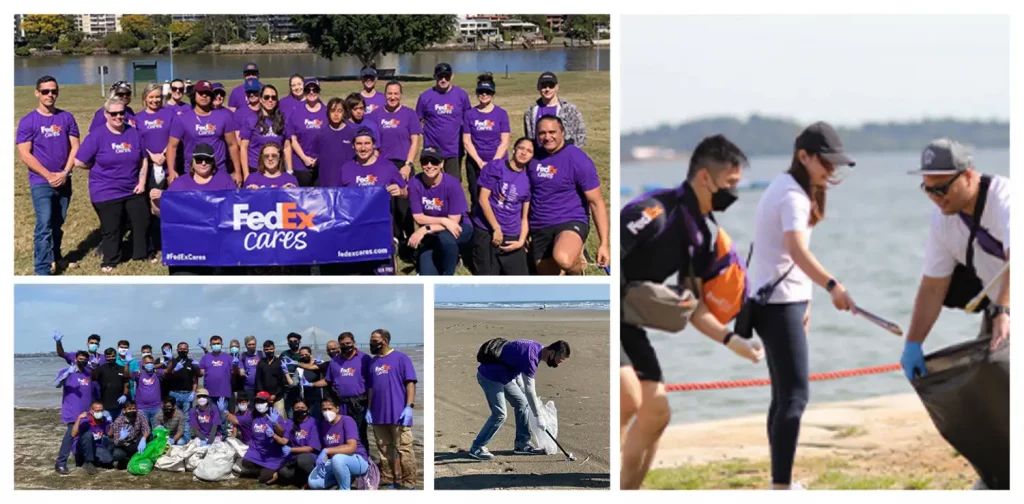FedEx Engages Employees with Beach Clean-Up Initiative

FedEx Volunteers during beach clean-ups. | Photo by FedEx.
Waste and pollution have become one of the world’s pressing matters, especially ocean waste. Ocean waste has massive impacts, from endangering marine biodiversity to affecting human’s health. While actions have sprung across the globe to remove trash from the oceans, we still have a long journey ahead. As one of the biggest shipping companies, FedEx showed responsibility by engaging its employees in beach clean-up activities.
The state of beach pollution
Oceans across the globe are turning into garbage dumpsters. Most ocean plastic waste originates from the land and enters the sea via rivers. Sea freight shipping also contributes to marine debris, with approximately 3,113 containers of goods falling from ships into the sea in 2020-2021. Without immediate action, the number of plastics in the oceans will likely outweigh the number of fish in 2050.
Some of the waste is being washed up by the waves and tides. It ends up on the beaches, severely impacting coastal communities and marine biodiversity. Toxic environments and microplastics, for instance, are making the environment highly unlivable for biodiversity, consequently affecting humans’ health and economic endeavors.
Taking responsibility
In 2021, FedEx generated 519,859 metric tonnes of waste, a significant increase from the previous year’s 361,952 metric tonnes. A good 67% of it was sent to the recyclers, while the remaining still went to landfills.
As a big multinational corporation in its 52nd year of running, FedEx has an enormous responsibility to manage the waste it generates. Aside from shifting its global operations to be carbon-neutral by 2040, the company has also engaged its employees to contribute to the environment through various activities with their communities.
In 2022, more than 455 FedEx volunteers and their family members joined in a beach cleaning initiative across 21 beaches in Australia, India, Japan, and Singapore. In the four-month program, volunteers removed 142,987 kilograms of garbage and plastic waste from the environment. However, how they handled the waste is unexplained as per this initiative.
“Building a sustainable future doesn’t happen overnight. It requires a collective behavior change,” said Kawal Preet, president of Asia Pacific, Middle East and Africa (AMEA) region at FedEx Express.
Beach clean-ups as community engagements
Beach clean-ups provide a way for companies to engage their employees while making meaningful impacts on the environment. Last year during World Ocean Day, Nestle Philippines’ employee volunteers conducted a dive and beach clean-up, working with marine conservation social enterprise Pure Oceans for waste recycling and education. Natalie Grace Toralballa, one of the employee volunteers, reported that the beach clean-up is a “very fulfilling experience.”
Community contribution matters. No matter big or small, communities have the power to drive significant changes toward a better world. In this matter, businesses also have an important role. They can generate sustainable changes by exposing, educating, facilitating, and engaging their employees to create positive social and environmental impacts within their communities.
Editor: Nazalea Kusuma
Kresentia Madina
Madina adalah Asisten Manajer Publikasi Digital di Green Network Asia. Ia adalah lulusan Program Studi Sastra Inggris dari Universitas Indonesia. Madina memiliki 3 tahun pengalaman profesional dalam publikasi digital internasional, program, dan kemitraan GNA, khususnya dalam isu-isu sosial dan budaya.

 Test Custom Feature Image
Test Custom Feature Image  Electric Vehicles Roam the Roads of Kenya
Electric Vehicles Roam the Roads of Kenya  Come Back Stronger: Building Philippines’ Resilient Economy Post-COVID-19
Come Back Stronger: Building Philippines’ Resilient Economy Post-COVID-19  5 Food System Actors That Have Taken the 123 Pledge to Reduce Food Loss & Waste
5 Food System Actors That Have Taken the 123 Pledge to Reduce Food Loss & Waste  How Protection Law and Global Commitments Can Accelerate China’s Wetland Conservation
How Protection Law and Global Commitments Can Accelerate China’s Wetland Conservation  The Potential and Power of K-pop Fandoms as Global Communities
The Potential and Power of K-pop Fandoms as Global Communities  Test premium post
Test premium post